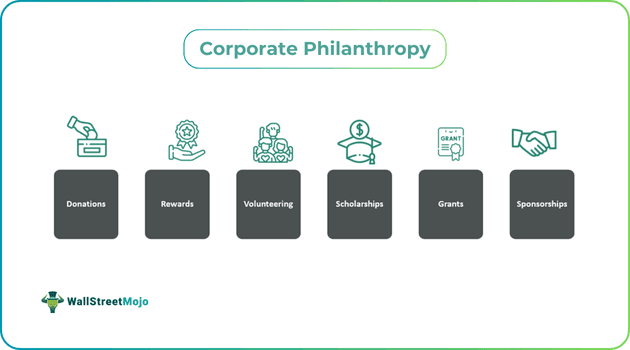Discovering How Company Philanthropy Shapes Brand Name Online Reputation and Customer Loyalty
Business philanthropy substantially affects brand reputation and consumer commitment. Firms that involve in authentic philanthropic efforts frequently see a favorable shift in exactly how customers perceive them. This positioning of worths promotes trust fund and psychological links with audiences. The effectiveness of these kind initiatives can differ greatly. Recognizing what really reverberates with consumers is important for brand names seeking to boost their social effect and market placement. What techniques will become vital for future success?
The Development of Company Philanthropy
As companies progressively recognize their function in society, the development of corporate philanthropy has actually changed from simple philanthropic contributions to a strategic element of brand identity. Initially, firms took part in philanthropy mostly for tax obligation advantages or to boost their public picture. In time, this method moved as stakeholders-- including investors, customers, and employees-- required a more genuine commitment to social responsibility.
Organizations began straightening their kind initiatives with their core values and service purposes, bring about more impactful and thoughtful contributions. This adjustment has encouraged companies to buy sustainable practices and neighborhood advancement, cultivating a feeling of function that reverberates with customers.
Technical innovations have actually assisted in openness and interaction, enabling companies to display their humanitarian initiatives much more effectively. Consequently, corporate philanthropy has become an important component of business method, with companies embracing the possibility to favorably influence society while enhancing their overall brand name story.
The Influence of Philanthropy on Brand Name Assumption
While firms participate in philanthropic efforts to advertise social good, these efforts significantly shape brand perception among customers. Company philanthropy can improve a brand name's picture by linking it with positive social effect and area involvement. Consumers often perceive brands that proactively join philanthropic tasks as even more trustworthy and accountable. This perception can affect getting choices, as consumers may choose brand names that demonstrate a dedication to social concerns.

Structure Emotional Links Via Providing
Corporate philanthropy serves as an effective tool for boosting brand identification by connecting business worths with area demands. With strategic giving, firms can foster area interaction and develop common values that resonate with consumers on an emotional level. This method not just strengthens brand credibility however additionally builds long-term links between organizations and their stakeholders.
Enhancing Brand Name Identification
They not just contribute to societal great however likewise forge deeper psychological links with their audiences when companies engage in humanitarian efforts. By straightening their brand name with charitable reasons, firms enhance their identification and signal worths that resonate with consumers. This placement produces a story that surpasses services and items, inviting customers to take part in a shared goal. As customers significantly focus on purpose-driven brand names, firms that proactively involve in offering can separate themselves in a jampacked market. Such efforts cultivate a sense of loyalty amongst consumers that feel personally connected to the brand name's values. Ultimately, corporate philanthropy becomes an important tool for enhancing brand identification, growing long-term relationships based on common ideas and emotional engagement.
Fostering Neighborhood Interaction
Various studies suggest that business involving in community-focused humanitarian initiatives can markedly reinforce emotional connections with their stakeholders. By spending in local projects and sustaining social causes, organizations grow a feeling of belonging and trust fund within the community. This involvement fosters a positive brand name image, as clients value business that demonstrate authentic worry for social issues. Employees typically feel more proud and inspired to be linked with an organization that focuses on community well-being. Therefore, customers are more probable to develop commitment towards brand names that actively add to significant causes. Eventually, cultivating area interaction via philanthropy not just improves brand online reputation but additionally develops enduring emotional ties that profit both the community and the firm it offers.
Developing Shared Values
Just how can organizations successfully create shared values that resonate with their stakeholders? Firms can accomplish this by aligning their philanthropic initiatives with their core mission and the interests of their neighborhoods. By involving in initiatives that resolve local requirements, organizations promote emotional links with consumers, boosting brand loyalty. Partnering with non-profits that show shared values enhances the brand name's photo and shows commitment to social responsibility. In addition, transparent communication regarding these efforts permits stakeholders to see the substantial impact of their payments. Ultimately, by integrating shared values right into their business philanthropy, companies not just boost their online reputations however additionally grow long-term partnerships with customers, resulting in boosted commitment and trust fund. This positioning is necessary in modern-day consumer decision-making.
Situation Studies: Successful Philanthropic Campaigns
Checking out effective humanitarian campaigns exposes numerous strategies that enhance brand name reputation. Impactful community initiatives, innovative partnership versions, and long-lasting interaction techniques have proven efficient in cultivating positive links with consumers. These situation research studies highlight the importance of thoughtful corporate giving up attaining both social and organization objectives.
Impactful Community Initiatives
Lots of business have effectively leveraged kind projects to improve their brand name credibility while making a purposeful impact in their areas. A modern technology company introduced a digital literacy program in underserved areas, providing training and resources that encouraged neighborhood citizens. This effort not only added to neighborhood growth but also positioned the business as a socially responsible leader. A major food company implemented a cravings alleviation project, partnering with local nonprofits to disperse dishes to households in requirement. This effort enhanced neighborhood connections and cultivated client commitment. With these impactful campaigns, business have actually demonstrated their dedication to social duty, efficiently straightening their brand name worths with the requirements of the areas they offer, inevitably boosting their total credibility.
Innovative Collaboration Versions
The success of impactful community initiatives usually rests on ingenious collaboration models that unite diverse stakeholders to deal with facility social obstacles. Study show exactly how firms, non-profits, and government entities can collaborate successfully. A multinational company partnered with a local non-profit to launch an education and learning program, pooling resources and competence to enhance area proficiency rates. Another instance included a technology firm and a medical care organization joining forces to establish a telemedicine remedy for underserved populations. These partnerships not only intensified the reach of philanthropic efforts but likewise reinforced the brands' credibilities by straightening their objectives with neighborhood demands. Ultimately, cutting-edge partnership versions offer as a driver for significant change and foster stronger links between brand names and their customers.
Long-lasting Engagement Techniques

Determining the ROI of Company Social Responsibility
As companies progressively buy company social duty (CSR) efforts, understanding the roi (ROI) connected with these efforts comes to be necessary. Gauging ROI in CSR is multifaceted, commonly including both quantitative and qualitative metrics. Economic returns can be assessed through enhanced sales, enhanced brand loyalty, and enhanced worker spirits, which can lead to higher productivity. In addition, companies may assess price savings linked to lasting techniques, such as minimized waste visit the site or energy usage.
Qualitatively, the effect of CSR on brand online reputation can be evaluated with customer assumption studies and social networks sentiment evaluation. Studies can supply insights into exactly how CSR tasks affect client loyalty and trust fund. Additionally, benchmarking against market requirements can aid companies evaluate their CSR effectiveness. Eventually, a comprehensive strategy to measuring ROI makes it possible for firms to make informed choices concerning future CSR investments, aligning strategies with both economic performance and social effect
Consumer Assumptions and Company Obligation
Increasingly, consumers anticipate companies to run with a solid feeling of business duty, viewing ethical techniques as a requirement for brand loyalty. This shift in expectation reflects a growing understanding of environmental and social issues, leading customers to favor brand names that line up with their worths. Customers are extra inclined to sustain companies that involve in clear practices, show sustainability, and add favorably to their areas.
Social media intensifies these expectations, enabling customers to share their experiences and viewpoints rapidly. Brands that fall short to fulfill these ethical standards risk backlash, while those that welcome corporate responsibility commonly appreciate enhanced online reputation and client commitment. As consumers require responsibility, firms should incorporate corporate social obligation right into their core strategies, focusing on ethical habits not equally as a marketing method, yet as a fundamental element of their operations. This alignment can ultimately result in more powerful brand fondness and continual success in open markets.
Future Trends in Corporate Philanthropy and Brand Commitment
The landscape of corporate philanthropy is evolving, influenced by the heightened customer expectations surrounding business obligation. Companies are increasingly integrating social impact into their core service approaches, not simply as a secondary task. Future trends suggest a shift toward transparency, with brand names sharing comprehensive information regarding their philanthropic initiatives and their direct effects on communities.
Modern technology is playing an important function, allowing real-time involvement in between brands and consumers. Social media platforms assist in straight interaction, permitting customers to voice their expectations and hold brand names responsible. Additionally, more youthful generations, especially Millennials and Gen Z, focus on sustainability and ethical practices, driving services to adopt more diligent techniques.
As corporate philanthropy becomes associated with brand identity, business that authentically straighten their goals with societal needs look here are likely to cultivate stronger customer commitment. This merging of worths will eventually shape the future of company reputation and consumer connections in a significantly conscientious industry.
Regularly Asked Concerns
Just How Do Consumers Learn about a Firm's Philanthropic Efforts?
Customers find a company's humanitarian initiatives through numerous networks, consisting of social media, news release, community events, and word-of-mouth. These opportunities promote understanding, allowing individuals to engage with brand names that line up with their values and rate of interests.
What Role Does Employee Participation Play in Company Philanthropy?
Employee participation in corporate philanthropy improves involvement, fosters a feeling of ownership, and reinforces team communication - corporate philanthropy. This involvement usually amplifies the influence of charitable campaigns, resulting in greater awareness and assistance for the firm's kind initiatives
Can Corporate Philanthropy Backfire on a Brand name's Online reputation?
Company philanthropy can indeed backfire on a brand name's online reputation if viewed as insincere or opportunistic. Unfavorable public understanding might arise, bring about lessened depend on and loyalty among customers who prioritize credibility in company activities.
Are Smaller Firms as Effective in Philanthropy as Larger Companies?
Smaller sized business can be equally effective in philanthropy as larger firms, often demonstrating agility and credibility. Their localized efforts might resonate more deeply with neighborhoods, cultivating authentic links in spite of limited sources compared to their larger counterparts.
Exactly How Can Firms Pick the Right Causes to Support?
Business can pick the best bring on by straightening their values with community needs, assessing stakeholder interests, and evaluating potential influence. This calculated technique cultivates authenticity, improves interaction, and enhances connections with consumers and the wider neighborhood.
While business engage in philanthropic initiatives to promote social great, these campaigns substantially shape brand name assumption amongst customers. As consumers significantly prioritize purpose-driven brands, business that proactively involve in providing can differentiate themselves in a crowded market. Lots of companies have effectively leveraged kind projects to boost their brand name online reputation while making a purposeful impact in their areas. Increasingly, customers expect business to run with a strong sense of corporate responsibility, watching honest methods as a requirement for brand name loyalty. As corporate great post to read philanthropy becomes synonymous with brand name identity, companies that authentically align their objectives with social demands are most likely to promote more powerful consumer commitment.